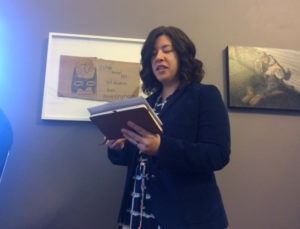How to fight the stigma of homelessness
 November 22, 2016
Category: Event, Featured, Medium, Method
November 22, 2016
Category: Event, Featured, Medium, Method
Dysfunctional families, distrust of the system, the lack of affordable housing — there are so many situations that could influence why a person can become homeless that others might not consider as they walk past those experiencing it.
“I think we tend to look for easy answers because homelessness is horrible and scary and you want that easy fix,” said Sarah Erdo, volunteer and community engagement manager at Bethesda Project. “The easy answer, I think, is the lack of affordable housing and the cycle of poverty.”
Bethesda Project and other local homeless services organizations hosted a panel at the Legend Galleries called “Bringing Homelessness Home” last week as part of Young Involved Philadelphia’s State of Young Philly event series.
The panel discussed the many challenges and aspects of homelessness that laypeople may be unaware of while, appropriately, surrounded by artwork reading encouragements such as “Perseverance with Dignity” and “Signs of Hope,” part of the gallery’s National Homelessness and Hunger Week exhibit.
Often those who are experiencing the cycle of homelessness have stigmas attached to them and can be regarded as less than who they are — human beings.
“I think a lot of it just has to do with treating people like people, not treating them like ‘This is a homeless person’ [or] ‘This is mental illness,’ but recognizing that this is a person dealing with a situation and then responding to them in that way,” said Matt Tice, clinical director of Pathways to Housing. “It’s not a person that you just step over or ignore if they’re asking you for money, but what we can do in a really simple way is just acknowledge that we all are people and this is a person with dignity, worth, and there is no reason that they are less than just because they are on the street.”
Even taking a moment to acknowledge a person that you don’t have change to give when they ask for it, can be a huge step in the right direction Erdo added.
According to Project HOME, 564,708 people were registered as experiencing homelessness during a nationwide Point-In-Time Count in January 2015. In Philadelphia’s January 2016 count, homeless outreach workers registered 705 unsheltered people on the streets.
Ken Norris, a homeless street outreach worker from Horizon House, often meets with those who are currently living on the streets of Philadelphia. At times, though, when he’s attempting to get them to come inside and or to a more stable environment, he’s turned away.
“A person told me that it’s pride, of course,” Norris said. “When first going out into the inclement weather, me coming upon [that situation] so many times, I would say, ‘How do you say no to my services when I say that I have this warm home for you?’”
Norris shared a story of an individual who he eventually found housing for but at first turned Norris’ offer away during a “Code Blue.” The reason, Norris was told, was that the individual thought the people running the shelter “are going to tell me what I have to do, when I have to do it.”
Norris then realized that in a way, this person was a warrior to be able to turn away what Norris was offering and then think of different ways that he would be able to survive such harsh conditions.
“I think the biggest challenges, systemically, are because of such a significant need in poverty levels and the clog in the housing availability system,” Erdo said. A solution, then, might be “opening up more opportunities for people to get [Philadelphia Housing Authority] vouchers. To get them out of transitional housing and into permanent housing is a huge challenge.”
It’s also essential to change the larger Philadelphia community’s attitude toward people on the street, she said — “it’s not an ‘us and them.'”
Trending News










